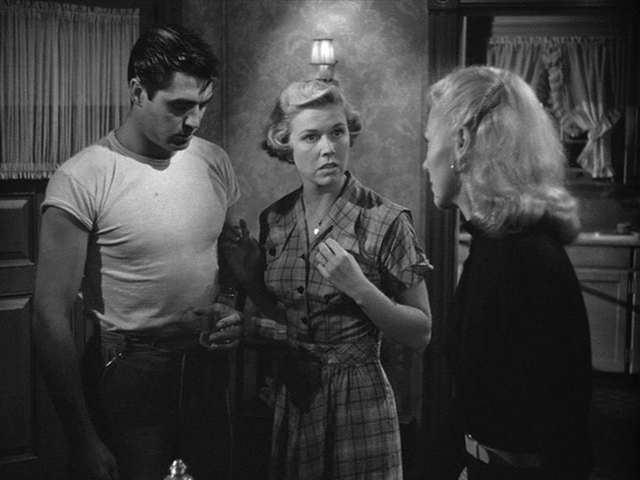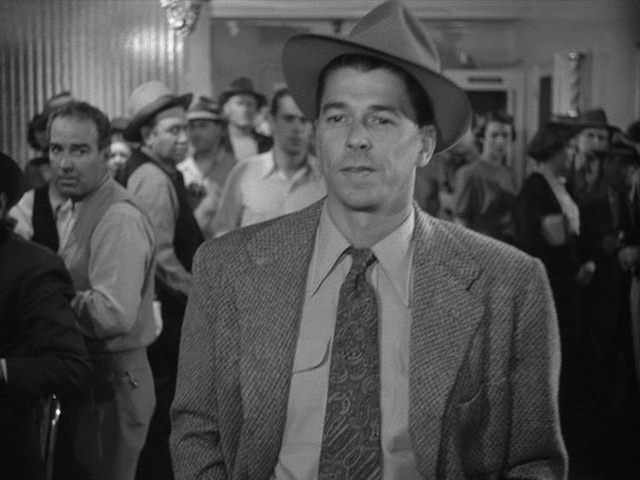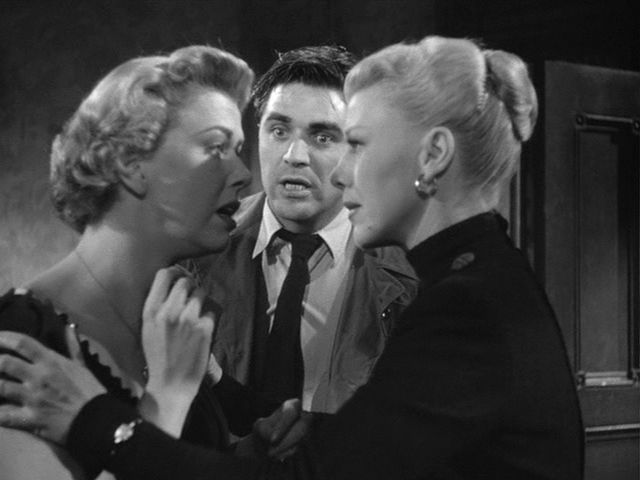|
Genres, Themes, Actors, and Directors:
- Courtroom Drama
- Doris Day Films
- Ginger Rogers Films
- Ronald Reagan Films
- Small Town America
Response to Peary’s Review:
As Peary notes, this tragic social drama — the “first Hollywood picture since 1936’s Black Legion to take a persuasive stand against the Ku Klux Klan” — does indeed “keep you on the edge of your seat”. However, it’s deeply disappointing that once again, nothing at all is mentioned about the Klan’s racist ideology; instead, the Klansmen are simply presented as a white-hooded version of small-town mob mentality. Fortunately, the genuine tension between the primary protagonists carries the film, and Rogers’ dilemma — whether to tell what she saw, or keep quiet for the sake of her sister’s happiness — is authentically compelling. As an added note, the dynamic between Marsha (Rogers), her sister Lucy (Doris Day), and Lucy’s husband Hank (Cochran) reminded me of the claustrophobic tension between Blanche, Stella and Stanley in A Streetcar Named Desire — though Cochran’s hunky Hank is infinitely more idiotic than Stanley, and Marsha far less fragile than Blanche.
Redeeming Qualities and Moments:
- Ginger Rogers’ “gutsy” performance

- Doris Day in a sympathetic early screen role (Peary notes that her “dramatic portrayal… is what earned her the lead in The Man Who Knew Too Much“)

- Ronald Reagan as a local journalist determined to expose the Klan

- An effective tale of loyalty versus justice

- Atmospheric cinematography

- A rare mid-twentieth-century American film to address the Klan

Must See?
No, but it’s definitely worth watching.
Links:
|
2 thoughts on “Storm Warning (1951)”
First viewing. I agree; not a must, though interesting and film noir fans should take note. I also noticed what seems to be the influence of ‘Streetcar’: Williams’ play took Bway very much by storm in 1947, and this film (an original screenplay) was released in 1951; it’s conceivable that something of Williams filtered through. It’s kind of funny, too, that there are role reversal moments in which Rogers seems as aggressive as Stanley and Cochran appears as dizzy as Blanche. Strangely, their ultimate private confrontation (very ‘Streetcar’-esque) is edited oddly, as if parts of it were censored. Aside from the trademark gutsiness of co-writer Richard Brooks, ‘Storm’ is most notable for the casting of (and not bad performances by) two stars turning tables on their musical comedy reps. It has recently been given a DVD release as part of a Reagan set (and is one of his better performances as well).
Thanks for the update on DVD status. Always gratifying to hear about this!